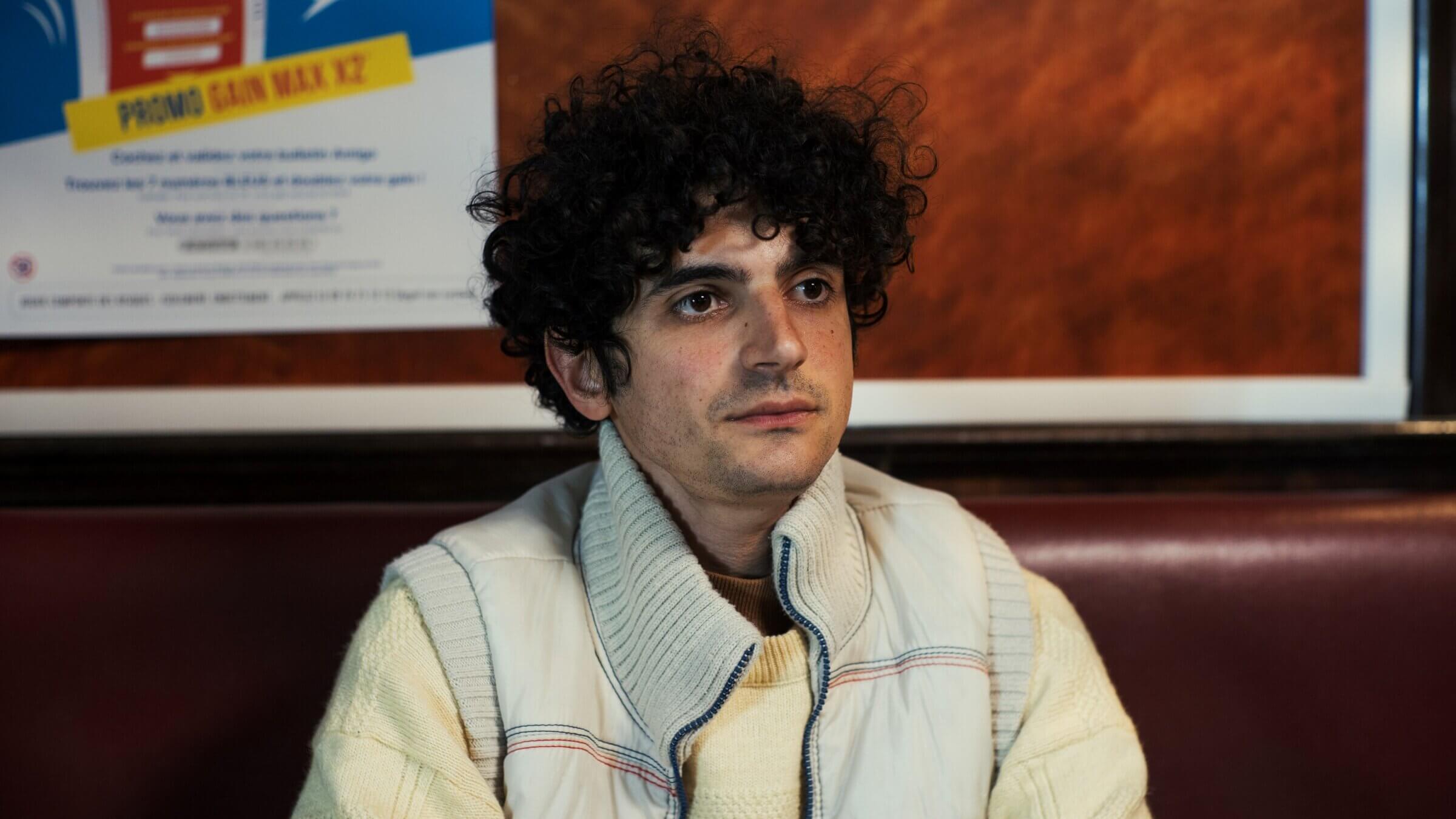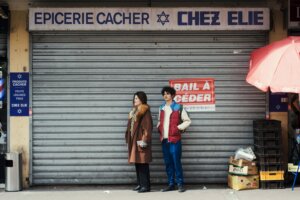A comedy about a vanishing Jewish community doesn’t seem so funny right now
In ‘The Last of the Jews,’ an ailing mother and her hapless son hide disturbing truths from each other

Ruben Bellisha, played by the newcomer Michael Zindel, is equal parts Charlie Chaplin and Jacques Tati. Courtesy of Film Movement
When the French film Le Dernier des Juifs, or The Last of the Jews, opened last month, it sparked a great deal of attention. Perhaps it will do the same when, rebaptized as A Nice Jewish Boy, it opens later this year on this side of the Atlantic. Do not pay much attention to this mindless title, for though the film is a comedy, it captures a painful and perhaps pivotal moment in the history of French Jewry — a moment that is no laughing matter.
Directed and co-written by Noé Debré, the film traces a few days in the life of its hero, Ruben Bellisha. Played by the newcomer Michael Zindel, Ruben is nice enough, if by “nice” you mean a nebbish. Resembling a mash-up of Charlie Chaplin and Jacques Tati, Ruben is as professionally aimless as he is personally awkward. His days, always flirting with entropy, are kept in motion by his neighbors — mostly the offspring of parents from North African and Middle Eastern countries — in the graffiti-scarred suburb where they have been abandoned less by an unbending fate than by an uncaring state. They lead lives of not-so-quiet desperation and, as with Ruben’s plans to become a Jewish rapper, more than a tad of quixotic aspiration.
He is hopeless at every job he holds but for one: caring for his ailing and apartment-bound mother Giselle, magnificently played by the veteran actress Agnès Jaoui. Ruben devotes his life to dissembling to Giselle about the changing world outside the tchotchke-filled apartment. (Giselle no doubt left Algeria, as did most of her compatriots, when the country, after a bloody and bitter war, won its independence from France in 1962.) Hiding the news that the last kosher butcher had closed, concealing the antisemitic graffiti painted by burglars on their apartment wall, lying both about the Muslim electrician who refuses to enter the apartment upon seeing the mezuzah at the door, and about the krav maga lessons his mother begged him to take, Ruben scrambles to spare Giselle the truth that they are, in effect, the last Jews in their neighborhood.
If this sounds familiar, it is probably because you have seen Goodbye Lenin! Wolfgang Becker’s 2003 bittersweet comedy depicts the efforts of a young man to hide the collapse of the Berlin Wall and reunification of Germany from his mother, a committed Communist who was lying in coma during these momentous events. In both films, the efforts made by the sons, which become ever more Rube Goldbergesque, are as doomed to failure as the mothers are doomed to die.

Le Dernier des juifs may also have a familiar ring for those who have read Promise at Dawn, the deeply moving memoir published in 1960 by the French war hero, postwar diplomat, and prize-winning author Roman Kacew (also known as Romain Gary). The crucial difference in Gary’s account is that the mother, not the son, is hiding the truth. An illegal Russian Jewish immigrant to France, the mother’s greatest love, after her son, is her idea of France. Like Giselle, Mina Kacew hides her terminal illness from her son, who had left France in 1940 to fight with the Free French. Indeed, she hides it even better than Giselle by writing and stockpiling dozens of letters, which she then arranges to have sent to her son on a regular basis after her death.
There are other French works that Debré’s film winks at, such as André Schwarz-Bart’s novel Le Dernier des Justes (The Last of the Just). Published the year before Gary’s Promise at Dawn, Schwarz-Bart’s autobiographical novel, which won the prestigious Goncourt Prize, tells the story of the Levy family, which with each new generation gifts the world with a tzaddik (wise man). If you squint, you might see Ruben as a tzaddik. His gentle sense of humor and, more important, his deep sense of humanity, often flickers across the screen. But once you widen your eyes, you see that Ruben’s character is too slight, his story too slender to bear more than a passing comparison to either Gary’s or Schwarz-Bart’s works.
But Debré’s story does reflect a different yet equally daunting challenge now facing French Jewry. Like the neighborhood portrayed in the film — which happens to be the Parisian suburb of Noisy-le-Sec — French Jews who long lived in certain suburbs have, since the early 2000s, been packing their bags to move elsewhere. That elsewhere is often other towns in France — what is sometimes referred to as “internal aliyah” — but also other cities and towns in Israel. Because census data excludes the categories of race and religion, the demographic statistics are shaky, but disturbing. Following the suburban riots of 2015, during which Jewish stores and synagogues were often targeted, some 50,000 to 60,000 Jews left “93,” or “quatre-vingt-treize,” the official administrative number of Seine-Saint Denis, the district just north of Paris.
It is too early to say if the Hamas massacre and Israeli military response, both of which spurred unprecedented levels of antisemitic acts in France, will quicken the process of actual, as opposed to internal, aliyah. In an interview, Debré announced that he was optimistic. “I believe that, apart from certain fringe movements, a majority of French understand that this combat [against antisemitism] is also their combat.”
But if you are a pessimist, you might conclude that the future, like the Jewish mother in The Last of the Jews, might be hiding a more tragic ending from us.






















